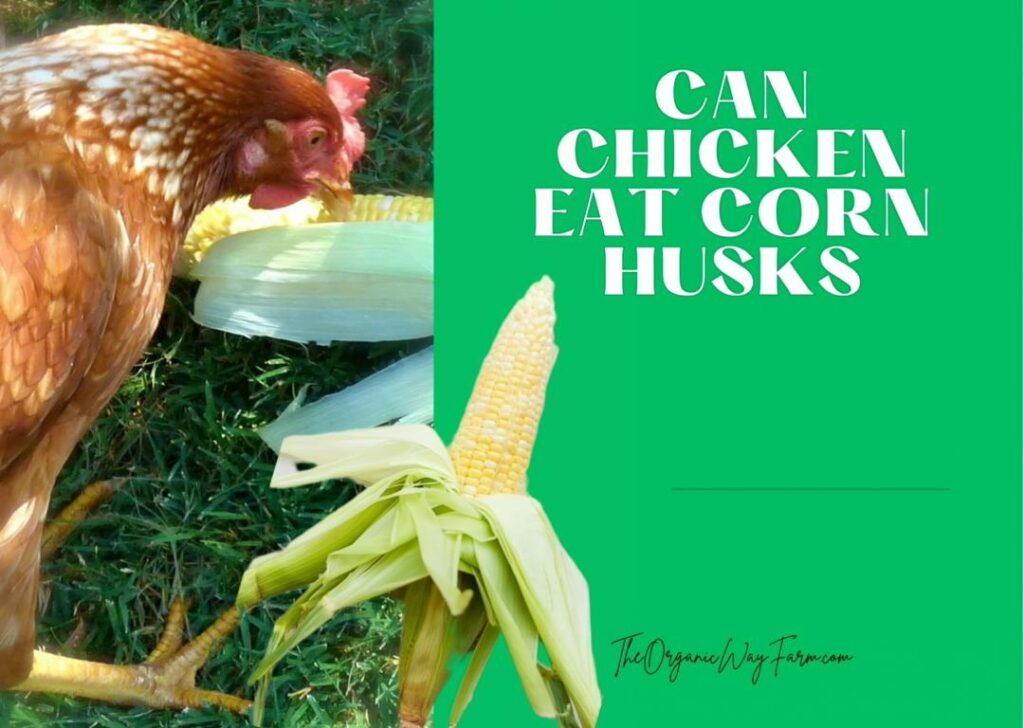If you own chickens or are thinking about raising them, you are likely interested in their diet. One common question that comes up is whether chickens can eat corn husks. It’s great to see people take such an interest in their flock’s food!
The simple answer is YES, chickens can eat corn husks! While they might not be the primary food source for your chickens, corn husks can be a good treat. They are high in fiber and can help support your chickens’ digestive systems. Knowing what is safe for our feathered friends is essential, especially when we’re looking for ways to provide them with a varied and balanced diet.
In this article, we will explore everything you need to know about corn husks and their place in your chickens’ diet. From how much corn husks are safe to feed to various benefits and risks, there’s a lot to learn. By the end, you’ll be better equipped to make informed decisions for your flock!
- Can Chickens Eat Corn Husks?
- How Much Corn Husks Can Chickens Eat?
- Best Way to Feed Corn Husks to Chickens
- Benefits of Feeding Corn Husks to Chickens
- Risks and Dangers of Feeding Corn Husks to Chickens
- Substitutes for Corn Husks for Chickens
- Frequently Asked Questions
- Final Thoughts
Can Chickens Eat Corn Husks?

Chickens are naturally omnivorous, which means they enjoy a wide variety of foods. Corn husks are not toxic and can actually be beneficial for our feathered friends. These husks are the outer layer of corn ears, and while they might not seem like a delicacy, they provide something chickens enjoy pecking at.
Interestingly, corn husks are made up mostly of fiber. This makes them a great option for chickens because fiber aids their digestive processes. Just like humans, chickens benefit from a good amount of fiber in their diets. Feeding them corn husks can help keep their digestive systems running smoothly. Plus, the act of pecking at the husks can be stimulating for the chickens, keeping them entertained and engaged.
While corn husks are safe to feed to chickens, it’s crucial to keep a few things in mind. Not all chickens will have the same preferences. Some may love corn husks, while others might be indifferent. It’s a good practice to introduce new foods slowly, allowing your chickens to explore and discover their likes and dislikes.
How Much Corn Husks Can Chickens Eat?
When it comes to feeding your chickens corn husks, moderation is key. While they are safe for chickens to eat, it’s vital not to overdo it. A general guideline is to offer corn husks as a treat, not as a staple of their diet. A handful or two per week is sufficient for most chickens.
In practice, this means if you have a small flock, you might want to consider offering corn husks a couple of times a week, ensuring that the bulk of their diet comes from balanced poultry feed. This balanced feed provides all the essential nutrients that chickens need to thrive—such as proteins, vitamins, and minerals.
In addition to providing husks, it’s important to observe how your chickens respond to them. If they enjoy picking at the husks, then they can be a fun addition to their diet! However, if you notice that they are not interested, it might be best to hold off and try something else.
Also, ensure that the corn husks you provide are clean and free from contaminants like chemicals or pesticides. If you’re growing your own corn, watch out for any treatments on the corn and be sure to wash the husks before feeding them to your birds. Just like us, chickens deserve to eat clean, healthy food!
We also want to keep an eye on how much we provide. If you offer too much corn husk all at once, it could disrupt their usual feeding routine. Chickens thrive on structure, so keeping treats to a minimum and incorporating them gradually will give your chickens a chance to adapt and make the most of their varied diet.
Best Way to Feed Corn Husks to Chickens
Now that we know chickens can eat corn husks, the next question is how to offer them correctly. The best way to introduce corn husks to your chickens is by ensuring they are fresh and intact. You can feed them whole, or you might want to tear them into smaller pieces to make it easier for the chickens to enjoy them.
Offering corn husks in a manner that mimics natural foraging is beneficial. One way to do this is to hang them up in their coop or run. This allows the chickens to peck at the husks and interact with them as they would in the wild. Simply tie the husks to a perch or a fence using twine or string. This method not only provides entertainment, but it also helps to keep their beaks busy.
It’s always a good idea to monitor how your chickens respond to new foods. Watch how they interact with the corn husks. Some chickens may prefer to dive right in, while others may be hesitant. If some chickens seem uninterested while others enjoy the treat, that’s perfectly fine! Each chicken is unique, and part of the joy of chicken-keeping is watching them explore different foods.
Another great method is to mix chopped corn husks with other treats or scratch grains. This makes for a sort of chicken salad, giving them a variety of textures and flavors to enjoy. The mixture approach can help entice picky eaters to try new things, which is wonderful for their overall diet.
Lastly, after feeding, make sure to remove any uneaten portions to keep their living space clean. Food waste can attract unwanted pests and create unsanitary conditions. Keeping things clean will help ensure our flocks stay healthy and thriving!
Benefits of Feeding Corn Husks to Chicken?
Hydration
Corn husks have a high water content, which can help keep our chickens hydrated, especially during hot weather. Chickens tend to drink less water than we might believe, so every little bit helps! Offering moist or fresh foods like corn husks can be a fantastic way to support their hydration needs.
Fiber
As mentioned earlier, corn husks offer plenty of fiber. A diet rich in fiber aids digestion by helping to keep food moving through the digestive tract. This is particularly beneficial for chickens, as it can reduce the chances of digestive issues. Healthy digestion means happier and healthier chickens!
Vitamins and minerals
Corn husks contain a few vitamins and minerals that can contribute to your chicken’s nutritional needs. While they shouldn’t replace a well-balanced diet, providing them alongside their usual feed can complement their intake of essential nutrients.
Mental stimulation
Feeding corn husks is also a source of mental stimulation for our chickens. By introducing varied textures and shapes, we encourage them to engage with their food actively. This keeps their minds sharp and their spirits high, both of which are crucial for their overall well-being.
Nutritional breakdown of corn husks
Now, let’s highlight the specific nutritional breakdown. Although corn husks are not packed with nutrients, they are low in calories and provide some hydration. They also contain small amounts of fiber and sugars. Taking a balanced approach to feeding our chickens ensures they receive the right amounts of everything they need to thrive.
Dangers of Feeding Corn Husks to Chickens
While corn husks are safe for our chickens, there can be some considerations to keep in mind. Overfeeding can lead to digestive challenges. If chickens eat too much fiber without enough balanced nutrients, it could lead to issues such as impaction or similar problems.
It’s also crucial to offer only clean corn husks. If they contain any molds, contaminants, or spoilage, that can create health risks for our flock. Be mindful of their freshness and avoid feeding them anything that might compromise their well-being.
Additionally, if birds are not familiar with corn husks, introducing them too quickly can lead to rejection. Some chickens might show initial hesitation or disinterest, and we certainly don’t want them to miss out on nutrients due to lack of familiarity!
Finally, always monitor your chickens after feeding them new treats. Every chicken reacts differently, so what might be a delightful treat for one could cause digestive upset in another. It’s essential to watch them, so we can act quickly if any issues arise.
Substitutes of Corn Husks for Chickens
If for any reason corn husks don’t sit well with your flock—or if your chickens simply prefer something else—there are plenty of substitutes! For example, other foods rich in fiber, such as leafy greens, kale, or even broccoli, can serve the same purpose as corn husks.
Vegetable scraps, provided they are safe for chickens, can also act as excellent treats. Many kitchen scraps can provide entertaining and nutritious options for our chickens. Things like carrot tops, beet greens, and even some fruits can add variety to our birds’ diets!
It’s a good practice to encourage a diverse diet among our chickens. They are less likely to grow bored with their food if they have a range of enjoyable options. Nutritionally balanced feed should remain at the core of their diet, but including various treats will not only keep them stimulated but also optimize their overall health.
Recycling kitchen scraps is not just convenient, but it also helps reduce waste! Let’s get creative with feeding our flock—there are countless ways to add flavor and variety to our chicken’s meals.
Can Chickens Eat Corn Husks? Frequently Asked Questions
Can baby chickens eat corn husks?
While baby chicks can eat finely shredded corn husks, it is recommended to introduce them very slowly. Their digestive systems are still developing.
Can chickens eat other parts of the corn plant?
Yes! Chickens can eat corn kernels and even the cobs, although the cobs should be given in moderation due to their hardness.
What other treats are safe for chickens?
Chickens enjoy a variety of treats including fruits, vegetables, and grains. Always avoid toxic items like chocolate and avocado.
How do I know if my chicken is sick from eating corn husks?
A sick chicken may show signs of lethargy, abnormal droppings, or not eating. If you notice any concerning behavior, consult a vet.
Are corn husks safe for older chickens?
Yes, older chickens can enjoy corn husks as part of a balanced diet, and they can be especially beneficial for keeping them entertained.
Final Thoughts
As we wrap things up, it’s clear that corn husks can be a fun and nutritious addition to our chickens’ diets. They provide hydration, fiber, and a bit of entertainment, all of which contribute to the health and happiness of our flocks. Remember, our chickens benefit from variety, so mixing things up with different treats keeps their diet exciting.
By understanding what works best for our chickens and keeping a watchful eye on their preferences and health, we can ensure that they lead happy lives. There’s so much to learn about raising chickens, so if you’re interested in more treats to add to your chicken’s diet, be sure to check out this article on Can Chickens Eat Grapes? and continue to explore the joy of chicken-keeping!






